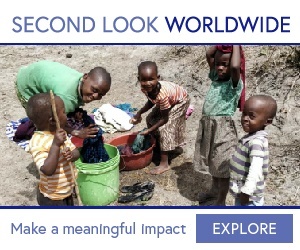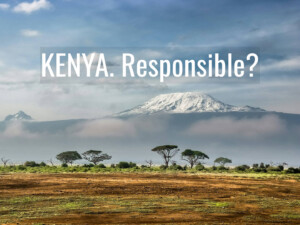Climate change, COVID-19, and the need for global systemic change

Tanner C Knorr picks up themes discussed in a webinar by the US-based Center for Responsible Travel and maps them onto five core tenets of the Future of Tourism Coalition. Mr Knorr is the founder of two “Good Tourism” Partners: Second Look Worldwide and Off Season Adventures. This is his fourth “Good Tourism” Insight.
“Crisis often breeds innovation. Destinations, communities, and businesses must not let this opportunity go to waste,” Gregory Miller said at the start of a webinar organised by the Center for Responsible Travel (CREST).
I also believe this is the case. We have an opportunity now to make change.
Dr Miller is the executive director of CREST, which in September 2020 released The Case for Responsible Travel: Trends & Statistics Report (PDF, hosted offsite). The report discussed key current challenges for the tourism industry — COVID-19 and climate change — and was followed up by a webinar to expand on the findings with a panel of experts.
Researchers from the Center for Sustainable Tourism at Arizona State University (ASU), including me, collaborated with CREST to consolidate the information from the webinar into a report so that these vital insights were not lost. ASU then looked to the Future of Tourism Coalition’s (FOTC’s) Guiding Principles as a framework for coding the insights. The ASU report (PDF, hosted offsite) was published on January 15, 2021.
As we examine the results of the report, together with the key FOTC principles, I believe that we can find parallels between the current and future impacts of large crises on the tourism industry and on the globe.
Weaving ideas together
Tourism worldwide, specifically in this current period of decreased arrivals, has constantly struggled to balance the three prongs of sustainability: economy, society, and environment. Traditionally, and still in many schools of thought today, tourism is primarily (or exclusively) seen as an economic driver. Indicators, such as GDP, have been used in conjunction with tourism development strategies to justify larger increases in arrivals in exchange for foreign export.
From some, the theory goes, as economic returns grow larger, social and environmental issues will sort themselves out because there will be larger investments in monetary capital to solve them. Economic growth is equated to positive social change. And through the distribution of resources, people will have a greater ability to come together to solve other issues, such as environmental degradation, poverty, and hunger.
This paradigm of continual growth in reality, however, is one of the greatest contributors to social, environmental, and economic inequalities and inequities within host destinations around the world. Up until COVID-19, this had reached its pinnacle through the phenomenon of overtourism — an extension of the economic growth paradigm. Businesses and communities had become reliant upon this paradigm, so when the system crashed, these inequities and inequalities became more prominent.
This situation is not dissimilar from what is happening across financial markets, ecosystems, and society more broadly today. The continual growth paradigm has been entrenched within specifically the western zeitgeist for decades, and has bled into many nations around the world.
The merging of business and political agendas has caused increased inequities and inequalities, not only within the tourism industry but in systems the world over. People see socioeconomic divides widening and are increasingly angry that they cannot change the systems governing their lives (cite any “grassroots” movement of the left or right in the west from the past 10 – 15 years).
So, how are these themes similar to the principles discussed with the CREST webinar to bring about change in the tourism industry? How do the specific FOTC principles discussed fit into the broader global narrative?
The key themes discussed in the webinar:
1. Collaborate in destination management (FOTC principle 3)
Panellists spoke about in-destination collaboration as a way to better manage COVID-19 and climate change. Destination leaders, private sector, and consumers were all seen as actors in the systems-thinking approach to collaboration and management.
A new system is clearly needed; one that goes beyond the current, linear, top-down paradigm of economic growth. The words here do not specifically imply the sustainability paradigm, but rather a systems-thinking approach.
For many institutions that talk about systems-thinking approaches to governance or change, their proposed new systems move past the three pillars of sustainability to encompass a plethora of subsystems.
Panellists identified that collaboration between several groups of stakeholder was necessary to make this shift: institutions, private sector, and residents. This would strike a balance and (ideally) give each their own voice.
Also see David Gillbanks’ “GT” Insight
“Has ‘Future of Tourism’ failed host communities?”
2. Choose quality over quantity (FOTC principle 4)
Panellists spoke about destination quality in terms leading to healthier travellers, residents, and places. However, there were different views on the source of demand for higher quality destinations.
So the saying goes: a nice place to live is a nice place to visit. When did the priorities of the tourists take precedence over the priorities of residents who are left with the (invisible) burden of tourism? The question is not: “Will tourism come back?” The question should be: “When tourism comes back, how should it look and whom should it benefit?”
We need to move past counting the number of tourists entering a destination and even the money they spend. There are a variety of other indicators we can use to identify how tourism enhances the quality of a destination, represented in concepts like social and environmental equity and justice.
Also see Tanner C Knorr’s “GT” Insight
“Tourism infrastructure, well-being, & how to ‘build back better’ for all”
3. Mitigate climate impacts (FOTC principle 8)
Panellists spoke about different levels of consumer and business stakeholder insight around climate change mitigation, and discussed how and who would manage mitigation at the destination level.
Climate change impacts us all, especially those working in the tourism industry. Setting aside the question of whether climate change can be mitigated, or if we’re solely at the adaptation point, collaboration for climate change-related strategies of any kind should include the voices of global stakeholders.
This point is similar to the first in that governments, institutions, businesses, and individuals must work together to see change in this area. A systems-thinking approach, I believe, will also help.
Also see David Gillbanks’ “GT” Insight
“Don’t panic: Opportunity, ingenuity will give us climate-friendly travel”
4. Diversify source markets (FOTC principle 11)
Panellists discussed the challenges and opportunities in diversifying source markets and boosting domestic tourism.
The shift to promoting domestic travel to replace international inbound tourism is seen by some to be a winning strategy, not only during COVID times but also after.
There are benefits, such as emission reduction (when compared to long-haul flights) and retaining domestic capital within the nation. However, the latter benefit isn’t available to destinations that have been net tourism exporters. For residents there who can afford to travel, their choosing to stay at home will not make up for the loss of inbound international visitors and the money they spend.
But perhaps economics, exports, and foreign exchange is not the point of the argument. Perhaps the benefit comes from decreasing the total amount of tourists in favour of more equitable distribution of economic, social, and environmental capital.
Also see Paul Rogers’ “GT” Insight
“Why build well-being into destination resilience and tourism recovery?”
5. Operate business responsibly (FOTC principle 13)
Panellists discussed how businesses can operate more responsibly to provide better outcomes for destinations.
Many businesses working within the continual growth model have, I would argue, operated irresponsibly. ‘Responsible’, however, is a relative term and needs to be qualified by some sort of interpretation. For shareholders, a business may be acting responsibly if it sends or receives as many tourists as possible. But for destination residents this may be deemed irresponsible. I believe shifting perspectives like this will help practitioners of tourism and other business make better decisions for a greater majority of stakeholders.
Also see the Partner/Sponsor Message
“Wake UP! to the transformative power of partnership & enterprise”
Perspective is also an excellent segue into the final key theme discussed in the webinar.
6. Consumers’ perspectives and responsibilities
The role of the consumer was the final distinct theme discussed in the webinar, though was not directly reflected in the Future of Tourism Coalition’s Guiding Principles. Panellists connected travellers’ responsibilities to FOTC principles 3 (collaborate in destination management), 4 (choose quality over quantity), and 8 (mitigate climate impacts).
In order to change any of the previous issues and themes, the perspectives and responsibilities of individuals must be understood at a deeper level. These challenges are too big for one government, one organisation, one business, or one person to accomplish.
We must move past exclusively top-down strategies to management, development, and change, and accept that each individual has a voice and a say in the existential challenges that face us today.
By opening ourselves up to alternative epistemology, listening and not just hearing each other, and leading with empathy and understanding, we may have a chance of creating a better system post-COVID.
Also see Kelly Louise’s “GT” Insight
“Pivots to make a difference: Educate, inspire, satiate”
As one panellist, Daniel Scott, said: “Looking after and doing right by our people is going to be a fundamental thing that we have to focus on over the next 20 years.”
The CREST webinar was moderated by K Denaye Hinds, Owner and Managing Director of JustaTAAD, LLC. The panellists included the aforementioned Dr Scott, Executive Director, Interdisciplinary Centre on Climate Change (IC3), University of Waterloo; Erin Francis-Cummings, President and CEO, Destination Analysts; and Ewald Biemans, Owner and CEO, Bucuti & Tara Beach Resort, Aruba.
What do you think? Share a short anecdote or comment below. Or write a deeper “GT” Insight. The “Good Tourism” Blog welcomes diversity of opinion and perspective about travel & tourism because travel & tourism is everyone’s business.
Featured image (top of post): Working women protest in Dhaka, Bangladesh. By MARUF_RAHMAN (CC0) via Pixabay.
Downloads
- CREST’s September 2020 report: The Case for Responsible Travel: Trends & Statistics (PDF, hosted offsite)
- Follow-up webinar report: Results from CREST 2020 World Tourism Day Webinar: “The Case for Responsible Travel: Lessons from COVID ‑19 for Tourism in a Changing Climate” (PDF, hosted offsite)
About the author

Tanner C Knorr is owner & founder of the sustainable tour operator and “GT” Partner Off Season Adventures and president of “GT” Insight Partner Second Look Worldwide, a 501(c)(3) not-for-profit organisation that ensures the benefits of tourism are realised in local communities by sponsoring infrastructure improvements. Off Season Adventures keeps more than 90% of the tour costs within host economies and contributes significantly to conservation within destinations. Extensive stakeholder meetings and international partnerships go into his work with both organisations.
With a Bachelors in Archaeology and a Masters in Administrative Studies (Economic Development & Tourism Management) from Boston University, Tanner has assisted in teaching tourism-related subjects at Harvard Extension School and Arizona State University. He is now a PhD Student at Arizona State University (Community Resources & Development, concentrating in Sustainable Tourism).






